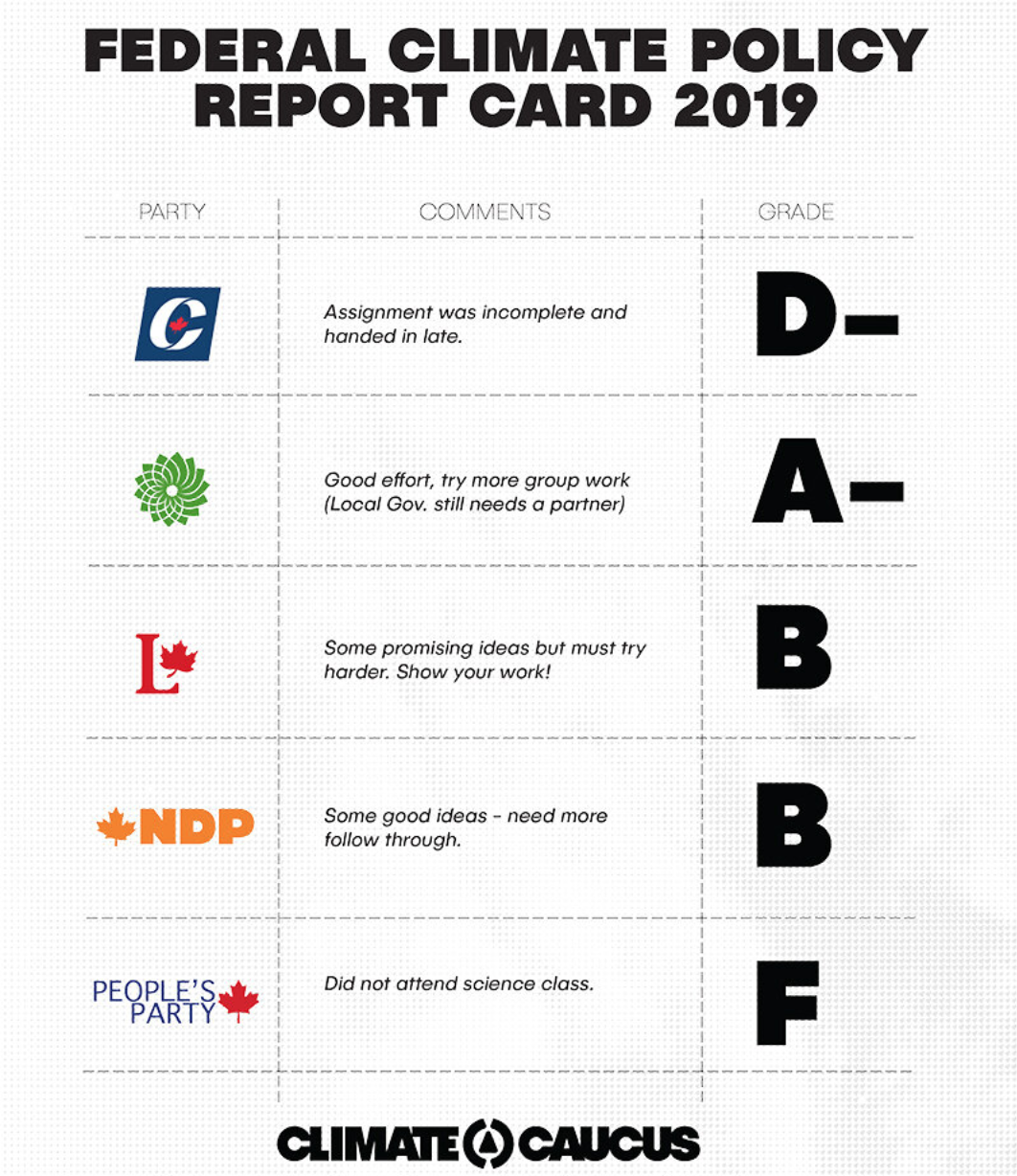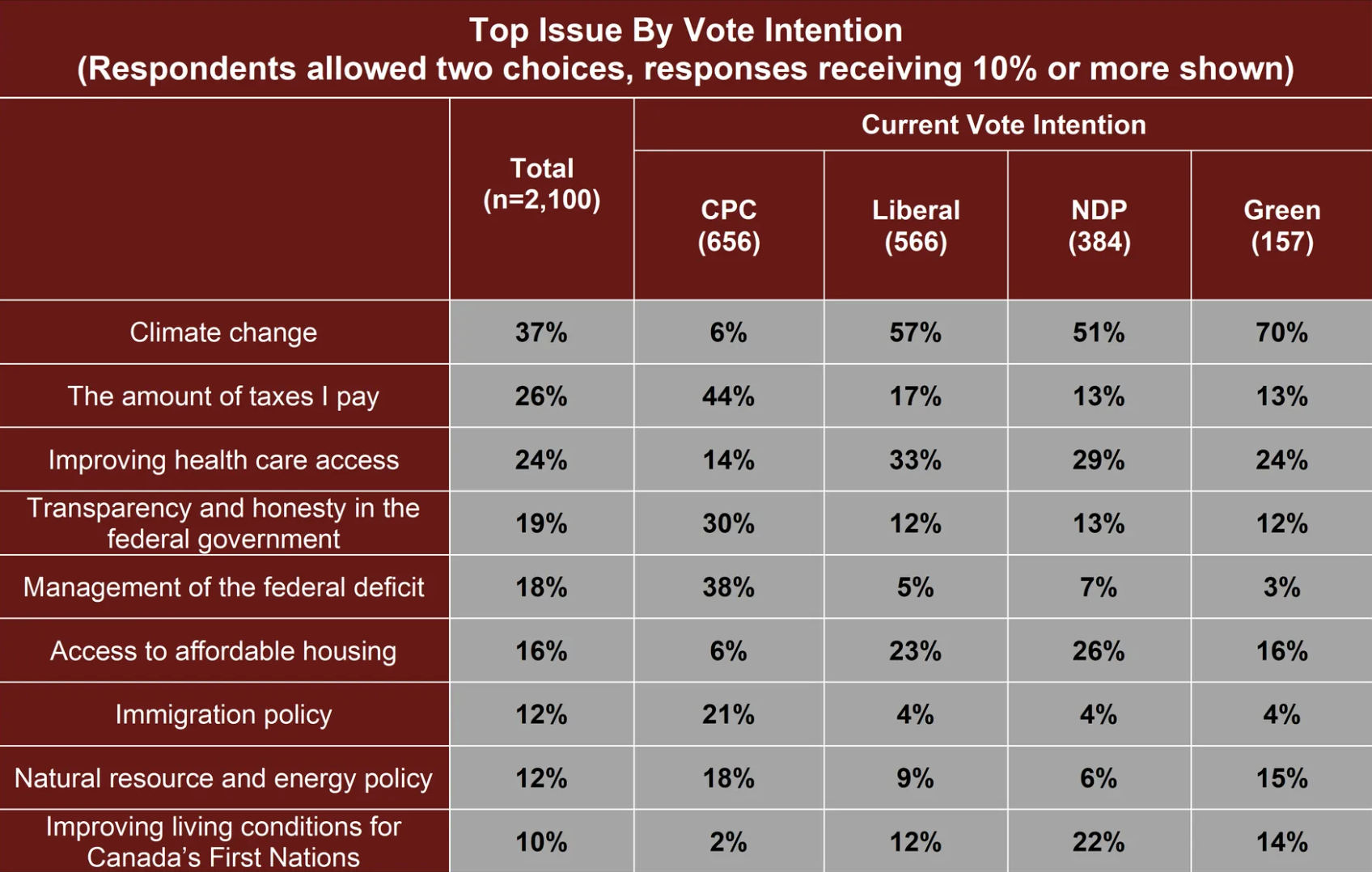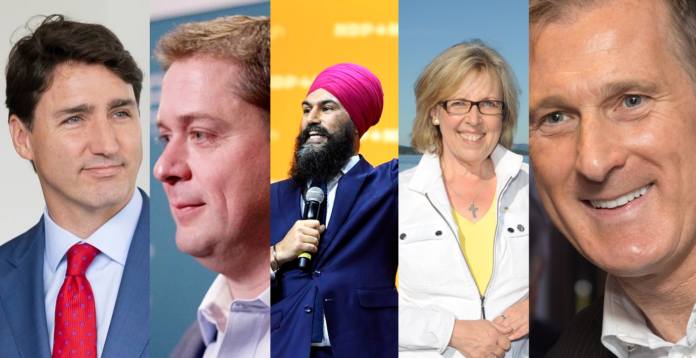The mayors and councillors of Canada have spoken.
Climate Caucus, a non-partisan network of over 200 mayors, councillors, and regional directors across Canada, has just released a report card grading federal political parties on their climate change platforms as seen from a local perspective.
See also: Nearly 60% of Canadians want Federal Election Day to be declared a holiday (SURVEY)
Unsurprisingly, the Green Party came first in the class with an A- while the People’s Party of Canada received a failing grade.
“We came together in a non-partisan, evidence-based way to see how the Conservatives, Greens, Liberals, and NDP stack up on this important file,” said Rik Logtenberg, Nelson, BC Councillor and co-founder and spokesperson for the Climate Caucus.
“Sadly, they’re not doing so well. All come at least somewhat short on the facts, figures, and fallout of climate change.”
The grading rubrics used to generate the report card took into account each party’s platform on transportation, buildings, waste, land use and adaption.

Here’s a breakdown of the results for each party:
Conservative Party of Canada
The Conservative Party of Canada was given a D for their transportation policies which involve eliminating the clean fuel standard, which would lead to an increase in emissions. The party also plans to work with local authorities to develop more sophisticated batteries for Zero-Emissions Vehicles but made no clear commitments.
No timeline or funding was available for when they plan to deploy an expanded network of charging or refueling stations.
Their platform promises a 20% tax refundable credit to anyone who spends between $1,000 and $20,000 on energy-efficient home renovations, but the Conservatives make no mention of a timeline or funding for local governments when it comes to making buildings more energy-efficient, earning them a D in this category as well.
While the party makes big promises for waste management – like banning export of waste unless it will be recycled at the destination, introducing a uniform nationwide plastics recycling regime which includes producer responsibility, and working to minimize plastic packaging – again no timeline or funding was promised.
Similarly, no timelines or new funding is promised for securing the facilities necessary for Canadians to adapt to the effects of climate change.
Green Party of Canada
The Green Party of Canada received As and A-‘s for their transportation, buildings, and land use policies, and got Bs for land use and waste management proposals.
They pledged $600 million in 2020-21, rising to $720 million by 2023 to develop regional rail networks and strengthen rail connections between regions.
Other transportation policy highlights include a Zero-Emissions Vehicle target of 100% by 2030 by banning the sale of internal combustion cars, plans to build a cross-country electric vehicle charging system, and requiring all passengers ferries to switch to electric or hybrid systems within the next 10 years.
See also: Green Party leader Elizabeth May pledges to plant 10 billion trees across Canada over 30 years
The Green Party also pledged $550 million a year to building retrofits in order to make them more efficient.
No specific funding or timeline is mentioned for waste management, although the party does pledge to implement e-waste collection and phase out the use of landfills for unsorted waste.
Proposals to protect land and ecosystems like reducing nitrogen fertilizers, investing in rebuilding soils to retain carbon, providing $3 billion of funding for initiatives like tree planting, creating fire breaks and fire suppression earned the party an A in the land use category.
The party received a B for policies pertaining to climate change adaption after pledging to direct the Canada Infrastructure Bank to invest in climate-proofing essential infrastructure, using federal powers to take on massive tree planting projects, and more. However no timeline or funding was provided for these initiatives.
Liberal Party of Canada
The Liberal Party of Canada received a B grade for their transportation policies which include the introduction of a clean fuel standard to achieve 30 million tonnes of annual reductions in GHG by 2030, cut corporate taxes by 50% for companies that manufacture products that have zero emissions, and provide every transit system across Canada with 10-year funding allocations.
Climate Caucus also criticize the Liberals for understanding climate change but failing to implement an overall emissions reduction target for infrastructure.
See also: Trudeau campaign pledges $40K interest-free loans to help make homes energy efficient
They received a B for waste management policies after announcing plans to ban single-use plastic waste by 2021, reducing plastic waste use in federal operations by 75% in 10 years, and pledging over $10 million to help small and medium businesses develop waste-free alternatives.
For the land use category, the party plans to invest $150 million by 2023-24 to give one-fourth of land and ocean waters in Canada protected status, and provide $3 billion to plant 2 billion trees by 2030 and use natural climate solutions to store carbon from agricultural lands, wetlands, and coastal areas.
They were given a B in the adaption category for committing $1 billion over the next decade to support local government efforts to adapt to climate change, and for proposing a national action plan to assist homeowners with potential relocation for those at the highest risk of repeat flooding but failing to include local government buildings or infrastructure in this plan.
New Democratic Party of Canada
The New Democratic Party of Canada received a B+ for their plans to invest $6.5 billion zero-emissions buses and electric trains, funding research and development for Zero Emissions Vehicles, and planning to make all government vehicles including Canada Post go electric by 2025.
They were lauded for understanding the need to reduce GHG emissions and pursuing plans to achieve net-zero emissions targets for buildings by 2030. But they were given a B in the ‘buildings’ category for failing to mention specific programs or funding to meet these goals.
See also: Jagmeet Singh helps gain momentum for NDP in British Columbia (REPORT)
For waste management, the NDP received an A grade after pledging to not only ban single use plastics by 2022 but also recycle those in circulation, and hold companies accountable for entire life cycle of plastics. The party also proposes two sources of funding for local governments to manage waste, and plans to work with local farmers to reduce food waste.
They proposed funding for the protection of 30% of land, freshwater, and oceans by 2030 and plan to work with other levels of government to develop a system of urban national parks.
Climate Caucus gave the NDP a C for their adaptation policies because while they state intentions to work with local authorities to ensure communities have adequate resources for coping with the effects of climate change, no specific funding figures or timelines have been provided.
People’s Party of Canada
The People’s Party of Canada received F’s across the board for all five categories evaluated by Climate Caucus, earning them the comment “did not attend science class”.
This is attributed to the fact that the PPC issued the following blanket statement in lieu of any policies that would help mitigate and fight the effects of climate change:
“Given the uncertainties over the scientific basis of global warming, and the certainties about the huge costs of measures designed to fight it, there is no compelling reason to jeopardize our prosperity with more government interventions.”
Importance for voters
According to a recent Angus Reid report, climate change has been the primary issue on the minds of most Canadian voters throughout the 2019 federal election campaign.
However for those who lean towards supporting the Conservatives, fiscal issues including personal taxation and the federal deficit take precedence.
Other topics of significance to citizens include improving health care access, transparency from their government, access to affordable housing, immigration policy, and improving living conditions for First Nations.

In a statement to press over the weekend, NDP leader Jagmeet Singh expressed his support for forming a minority government with Trudeau’s Liberals, should the Conservatives win the most seats but fail to secure a majority.
He has since dialed back, stating that his priority is to focus on his own party’s performance. Meanwhile Trudeau has refused to state whether or not he’d be open to forming a coalition government with the NDP.
Opposition leader Andrew Scheer, on the other hand, has stated that his aim is to prevent a minority Liberal-NDP government by making sure the Conservatives secure a majority of seats in the House of Commons.


